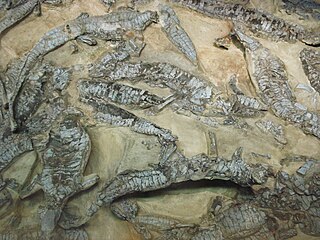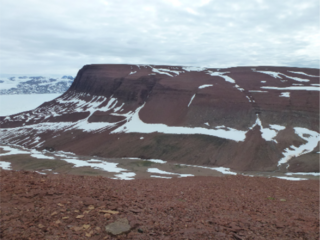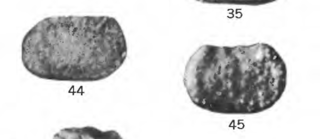| Scoresby Land Group | |
|---|---|
| Stratigraphic range: Triassic | |
| Type | Group |
| Sub-units | Wordie Creek Formation, Pingo dal Formation, Gipsdalen Formation, Fleming Fjord Formation |
| Underlies | Kap Stewart Group |
| Overlies | Schuchert Dal Formation, Foldvik Creek Group |
| Location | |
| Country | Greenland |
The Scoresby Land Group is a geologic group found in the Jameson Land Basin, Scoresby Land, East Greenland. It preserves fossils dating back to the Triassic period. [1] It comprises the Wordie Creek Formation (Lower Triassic), Pingo Dal Formation (?Lower Triassic), Gipsdalen Formation (Middle to Upper Triassic) and the Fleming Fjord Formation (Upper Triassic). It is underlain by Upper Permian beds of the Schuchert Dal Formation and overlain by Rhaetian beds of the Kap Stewart Group. [2]

Jameson Land is a peninsula in eastern Greenland.

In the geologic time scale, the Changhsingian or Changxingian is the latest age or uppermost stage of the Permian. It is also the upper or latest of two subdivisions of the Lopingian Epoch or Series. The Changhsingian lasted from 254.14 to 251.9 Ma ago. It is preceded by the Wuchiapingian age/stage and is followed by the Induan age/stage.

The Induan is the first age of the Early Triassic epoch in the geologic timescale, or the lowest stage of the Lower Triassic series in chronostratigraphy. It spans the time between 251.9 Ma and 251.2 Ma. The Induan is sometimes divided into the Griesbachian and the Dienerian subages or substages. The Induan is preceded by the Changhsingian and is followed by the Olenekian.

Aetosaurus is an extinct genus of pseudosuchian reptile belonging to the order Aetosauria. It is generally considered to be the most primitive aetosaur. Three species are currently recognized: A. ferratus, the type species from Germany and Italy; A. crassicauda from Germany; and A. arcuatus from eastern North America. Additional specimens referred to Aetosaurus have been found in the Chinle Group of the southwestern United States, and the Fleming Fjord Formation of Greenland. Specimens of Aetosaurus occur in Norian-age strata.

Cyclotosaurus is an extinct genus of temnospondyl within the family Mastodonsauridae. It was of great size for an amphibian, had an elongated skull up to 56 cm (22 in).

Fadenia is an extinct genus of eugeneodontid holocephalian chondrichthyan from the Carboniferous Period of Missouri, the Permian period of Greenland, and the Early Triassic epoch of British Columbia, Canada.

The Fleming Fjord Formation, alternatively called the Fleming Fjord Group is an Upper Triassic geological formation in the northeastern coast of Jameson Land, Greenland. It consists of terrestrial sediments and is known for its fossil content.

Bobasatrania is an extinct genus of prehistoric bony fish that survived the Permian-Triassic extinction event. Fossils of Bobasatrania were found in beds of Changhsingian to Ladinian age. It was most speciose during the Early Triassic.

Paratypothorax is an extinct genus of aetosaur, known from a single species, Paratypothorax andressorum. It was a broadly distributed member of the group found in Germany, North America, and possibly parts of Gondwana. The best specimens come from Germany, though for more than a century they were mistakenly considered phytosaur armor. Paratypothorax was a large and wide-bodied typothoracine aetosaur, as well as the namesake of the tribe Paratypothoracisini.
Mitredon is an extinct genus of cynodonts which existed in the Fleming Fjord Formation of Greenland during the Rhaetian age of the Late Triassic epoch. The type and only species is Mitredon cromptoni.
The Norian is a division of the Triassic Period. It has the rank of an age (geochronology) or stage (chronostratigraphy). It lasted from ~227 to 208.5 million years ago. It was preceded by the Carnian and succeeded by the Rhaetian.
The Kap Stewart Group is a geological group in eastern Greenland of Late Triassic (Rhaetian) to Early Jurassic (Sinemurian) age. It consists of a 155-600 m thick sequence of interbedded mudstones and fluvio-deltiac sandstones deposited in a "large wave and storm-dominated lake".
Lars Bjørn Clemmensen is a Danish Professor of Sedimentology in the Department of Geosciences and Natural Resource Management, Copenhagen University. Lars was born in Valby (Copenhagen) and grew up in Hvidovre, before moving to Frederiksberg. He extensively worked with the geology of Greenland, mostly on the Late Triassic of Jameson Land, in East Greenland. He was part of 10 expeditions to Greenland. With a publication record over 100 titles that grant him an h-index of 27 mainly on sedimentology and stratigraphy. In 1997 a new mammal from the Triassic of East Greenland was named after him: Haramiyavia clemmenseni. Co-author of the species Cyclotosaurus naraserluki.
The Wordie Creek Formation is an uppermost Permian and Lower Triassic geologic formation in Greenland, outcrops of which are located in Northeast Greenland National Park. In 2017, it was suggested to be raised to group status, as the Wordie Creek Group.

Scoresby Land is an area of Eastern Greenland, which lies partly in Sermersooq and partly in the Northeast Greenland National Park zone. The area is uninhabited, except for Mestersvig, a military outpost.

Carlsberg Fjord is a fjord in King Christian X Land, eastern Greenland.
Fleming Fjord is a fjord in King Christian X Land, eastern Greenland.

Issi is a plateosaurid dinosaur described in 2021 from the Late Triassic Fleming Fjord Formation of Greenland. It contains one species, Issi saaneq; the full binomial name means "cold bone".

Roundyella is an extinct genus of ostracod belonging to the order Leperditellocopida and family Scrobiculidae. Specimens have been found in beds of Devonian to Triassic age in Australia, Asia, Europe, North America, and South America.